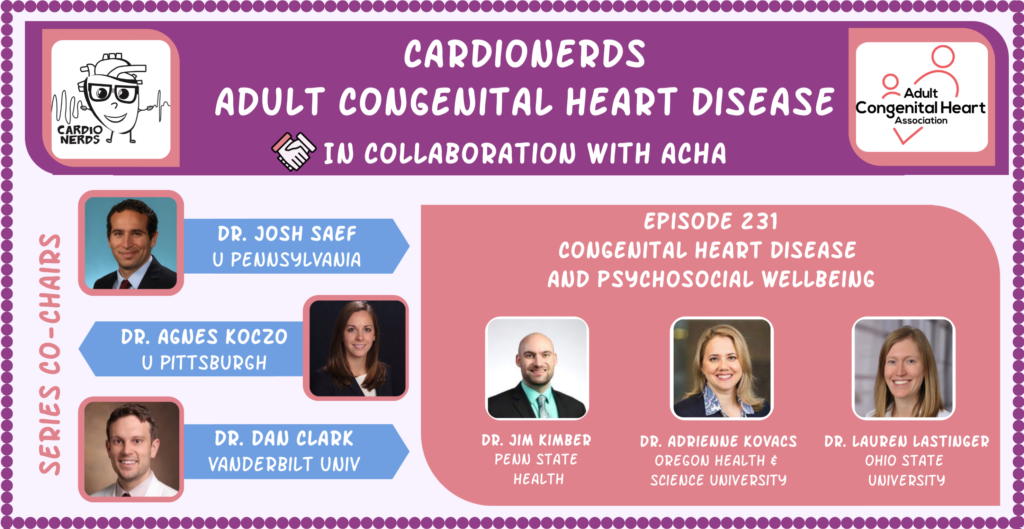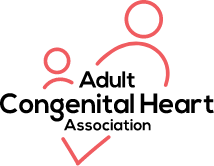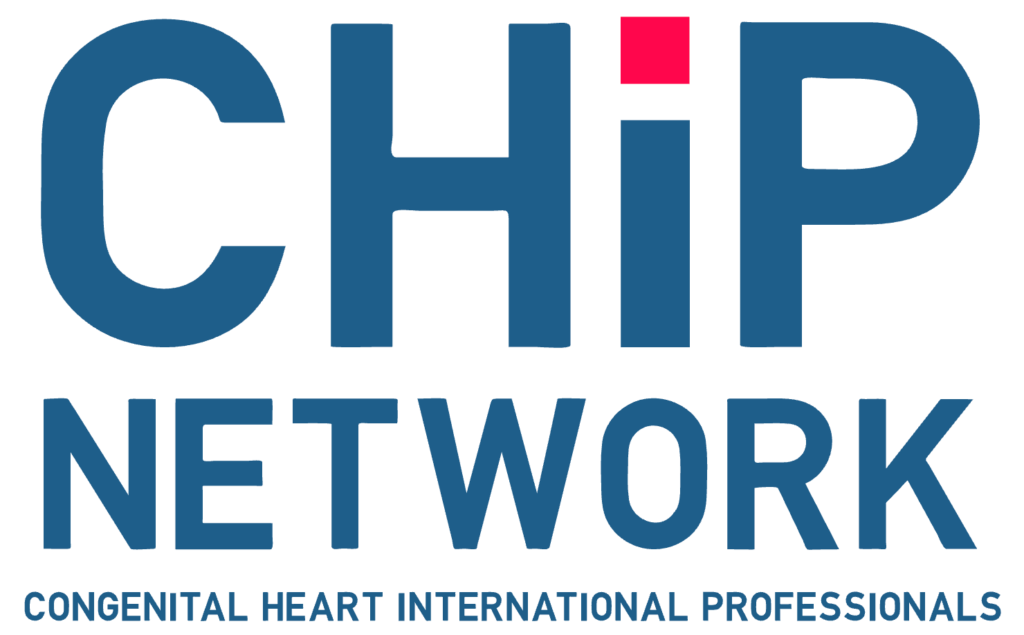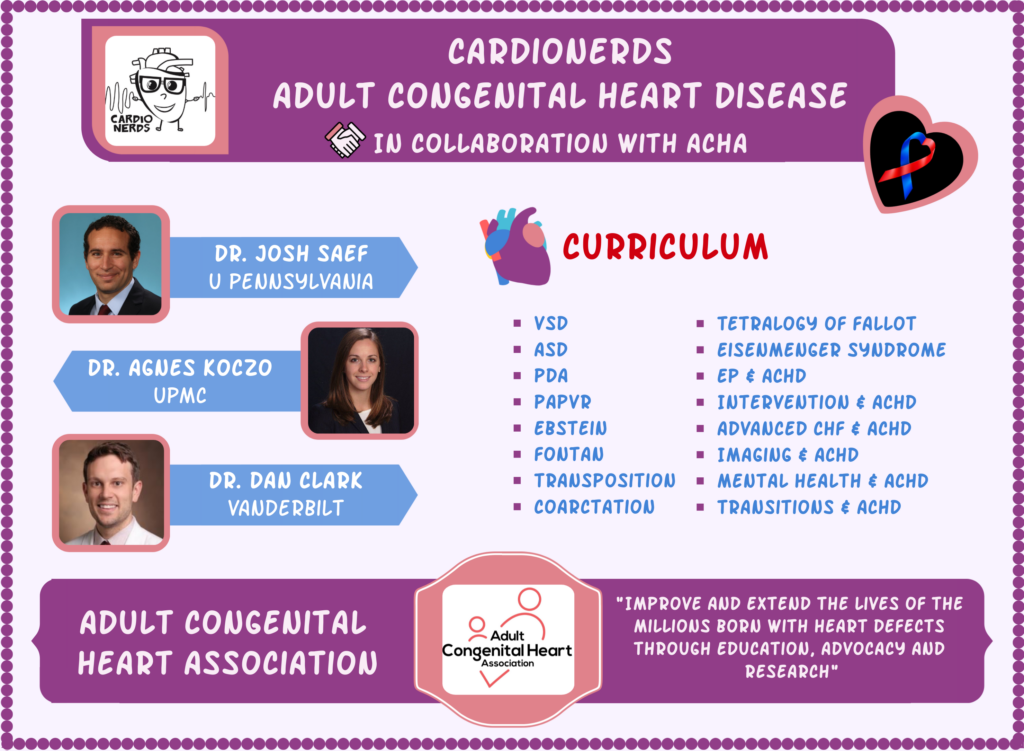Cardionerds: A Cardiology Podcast

231. ACHD: Congenital Heart Disease and Psychosocial Wellbeing with Dr. Adrienne Kovacs and Dr. Lauren Lastinger
CardioNerds Dr. Josh Saef, Dan Ambinder, join Dr. Jim Kimber and interview experts Dr. Adrienne Kovacs, and Dr. Lauren Lastinger and discuss behavioral health needs and psychosocial wellbeing in the congenital heart disease population. In this episode, our experts tackle issues surrounding mental and behavioral health including anxiety/depression, ADHD, neurodevelopmental disabilities, psychosocial challenges, stressors unique to patients with ACHD and their families, and how the healthcare system can better optimize mental health care for the CHD patient population. Audio editing by CardioNerds Academy Intern, Pace Wetstein.
The CardioNerds Adult Congenital Heart Disease (ACHD) series provides a comprehensive curriculum to dive deep into the labyrinthine world of congenital heart disease with the aim of empowering every CardioNerd to help improve the lives of people living with congenital heart disease. This series is multi-institutional collaborative project made possible by contributions of stellar fellow leads and expert faculty from several programs, led by series co-chairs, Dr. Josh Saef, Dr. Agnes Koczo, and Dr. Dan Clark.
The CardioNerds Adult Congenital Heart Disease Series is developed in collaboration with the Adult Congenital Heart Association, The CHiP Network, and Heart University. See more
Disclosures: None
This episode is made possible with support from the 3rd Annual Going Back to the Heart of Cardiology (A MedscapeLIVE Conference). Join Dr. Robert Harrington and Dr. Fatima Rodriguez December 3-5, 2022 at the Hilton La Jolla Torrey Pines in San Diego, CA for this innovative event. Network with your colleagues, attend engaging presentations by renowned cardiologists, participate in conference activities, and earn up to 10.25 CME/CE credits. You don’t want to miss the keynote presentation by health and fitness expert Bob Harper (NBC’s The Biggest Loser). Earn up to 3.0 additional CME/CE credits by adding this year’s NEW Virtual Interventional Session: Cath Lab Challenge to your conference registration. Register today with code CARDIONERDS for 30% OFF your registration. Click here for more information.

Pearls • Notes • References • Guest Profiles • Production Team

CardioNerds Adult Congenital Heart Disease Page
CardioNerds Episode Page
CardioNerds Academy
Cardionerds Healy Honor Roll
CardioNerds Journal Club
Subscribe to The Heartbeat Newsletter!
Check out CardioNerds SWAG!
Become a CardioNerds Patron!
Pearls – Congenital Heart Disease and Psychosocial Wellbeing
- Among patients with congenital heart disease, symptoms of anxiety are more common than symptoms of depression. “Heart-focused anxiety” relates to symptoms attributable to a heart condition including fear of appointments, surgery, or health-uncertainty. It is important to differentiate this from generalized anxiety.
- Predictors of depression and anxiety include patient-reported physical health status. Defect severity (mild, moderate, great complexity) and physician-diagnosed NYHA class were NOT associated with rates of depression/anxiety [2].
- Despite CHD, patient self-reported Quality of Life (QoL) is relatively high. Predictors of decreased QoL include older age, lack of employment, never having married, and worse self-reported NYHA functional class
- Important treatment strategies include: education for patients and caregivers, early identification and referral to mental health providers, incorporation of providers into CHD teams, and encouraging physical activity and peer-interaction.
Show notes – Congenital Heart Disease and Psychosocial Wellbeing
Notes (developed by Dr. Jim Kimber)
Mental Health Terminology:
Adults with CHD face the same mental health challenges as people who don’t have a heart condition. Symptoms of depression and anxiety are the most common: Approximately 1/4 – 1/3 of CHD patients will struggle with clinically significant depression or anxiety at any one point. Up to ½ will meet lifetime diagnostic criteria for these conditions
- Mood and anxiety disorders differ in that they have separate diagnostic criteria. Importantly, research often uses self-reported symptoms, rather than patients who have formally met diagnostic criteria.
- Historically, the focus has been on depression. However, elevated symptoms of anxiety are much more common than elevated symptoms of depression.
- It is important to make the distinction between “Generalized Anxiety,” and “Heart-Focused Anxiety.”
- Heart-Focused Anxiety: symptoms of anxiety directly related to having a heart condition, such as fear of appointments / worry about a decline in health status, getting an ICD, preparing for surgery, transplants, or having a shortened life expectancy, etc. This may also include a significant component of health uncertainty – the idea that patients are aware of need for a likely intervention but without ability to prognosticate timelines (e.g. need for valve replacement). This component differentiates CHD patients from those with acquired heart disease who have not been surrounded by such uncertainty for significant components of their life.
- Generalized Anxiety: excessive worry about a lot of factors beyond their control and accompanied by other symptoms like: muscle tension, sleep disturbance.
- Heart-Focused Anxiety: symptoms of anxiety directly related to having a heart condition, such as fear of appointments / worry about a decline in health status, getting an ICD, preparing for surgery, transplants, or having a shortened life expectancy, etc. This may also include a significant component of health uncertainty – the idea that patients are aware of need for a likely intervention but without ability to prognosticate timelines (e.g. need for valve replacement). This component differentiates CHD patients from those with acquired heart disease who have not been surrounded by such uncertainty for significant components of their life.
- Manifestations of mood and behavioral health problems include: impaired peer relationships, impaired romantic relationships, poor school or work performance, difficulty getting or keeping a job. Persons may struggle with inconsistent medical follow-up, inconsistent compliance, and substance abuse.
Predictors & Prevalence of Depression / Anxiety:
- Defect Severity (mild, moderate, great complexity) was not associated with depression or anxiety. Similarly, physician diagnosed NYHA Class was not associated with depression/anxiety [2].
- Known predictors: patient-reported physical health status impacts symptoms of depression/anxiety [2].There is also a link between social wellbeing and psychological well-being. Other studies have highlighted that perceived health status is an important predictor.
Risk Stratification
All patients with congenital heart disease are at risk for mental health disorders and need to be screened. Those at heightened risk include patients with genetic syndromes (in particular, those with 22q11 deletion, associated with more severe psychiatric disorders), prematurity, longer hospital stays, and those with lower family socioeconomic status.
Patients who have undergone cardiopulmonary bypass have higher likelihood of neurologic insults (CVA), but also cognitive dysfunction following surgery. In research, Apolipoprotein E has been predictive of neurodevelopmental dysfunction following cardiac surgery.
Other factors, including the number of surgeries, and how often they were separated from peers growing up might also impact mental health well-being in adults.
Quality of Life (QoL) and Assessment
- International Study looking at patient-reported outcomes in adults with CHD.
- Over 4,000 patients from 15 countries were enrolled.
- Self-Reported Questionnaires administered to gain information on perceived health
status, psychological functioning, health behaviors, quality of life (Scale 0-100) [9]
- Patients have lived with CHD their entire life, and report relatively high QoL
- Older age, lack of employment, never having married, and worse NYHA functional class (self- reported) are associated with lower QoL
- Older age, lack of employment, never having married, and worse NYHA functional class (self- reported) are associated with lower QoL
Alternative Assessment for Nonverbal Patients:
- Concerns may come from caregivers or parents
- May demonstrate behavioral changes: outbursts, changes in feeding/eating habits or weight loss/gain, changes in sleeping patterns, fatigue, low mood, anhedonia
- Screening should begin early in childhood (early assessment and diagnosis allows for enrollment in beneficial social / developmental programs)
- Cardiac Neurodevelopmental Outcome Collaborative (CNOC): recommend screenings for various ages and provide suggested screening algorithms.
Transition to Adult Teams: process that occurs during early adolescence
Goals: stay in uninterrupted health care throughout their lives, avoid lapses in care, have an established process, allow patients to develop knowledge and skills to assume maximal responsibility for their healthcare management, and adapt information delivery as necessary
- The I <3 Change Website provides information for people transitioning from pediatric to adult cardiology teams
- Beginning in adolescence, pediatric provider is recommended to speak independently with their cardiologist at every visit.
- Transition is a family process: parents are involved in care and successful transition to help bridge the gap towards independence for the patient
Strategies to Ensure Treatment Success
Education is Key:
- Parents and caregivers need an understanding of what CHD concerns are, expected follow up needs, etc.
- Engage all stakeholders in Medical Home: home health aide, caregiver, primary care physician, etc.
Utilize Screening Tools and Implement Routine Screening
Refer to Mental Health Provider when Appropriate
Embed mental health professional into the Team: identify providers who have an interest in mental health (psychologist / psychiatrist) who are qualified to treat patients with congenital heart disease
- Improves access and reduces stigma
- Allows for ease of access / rapid consultation
Encourage appropriate physical activity: exercise and physical activity has physiologic and mental health benefit, improves mood, stress, anxiety, etc. Mental health benefit is present regardless of type / intensity / duration of activity
- Ask patients if they avoid particular activities and provide reassurance
Offer opportunities for peer interaction: patient education sessions, etc.
Provide Positive Reinforcement: comment on patients’ resilience and effective coping.
Destigmatize It!
Practice of carefully worded Key Sentences help to destigmatize mental health disorders:
- “Does thinking about your health every make you worried or depressed?”
- “How are you doing from a psychological perspective?”
- “I know that patients sometimes struggle with low mood or anxiety. If that ever happens to you, let me know, and we can discuss it.”
References – Congenital Heart Disease and Psychosocial Wellbeing
Gonzalez, V.J., et al., Mental Health Disorders in Children With Congenital Heart Disease. Pediatrics, 2021. 147(2).
Kovacs, A.H., et al., Depression and anxiety in adult congenital heart disease: predictors and prevalence. Int J Cardiol, 2009. 137(2): p. 158-64.
Gaynor, J.W., et al., Validation of association of the apolipoprotein E ε2 allele with neurodevelopmental dysfunction after cardiac surgery in neonates and infants. J Thorac Cardiovasc Surg, 2014. 148(6): p. 2560-6.
Schmithorst, V.J., et al., Organizational topology of brain and its relationship to ADHD in adolescents with d-transposition of the great arteries. Brain Behav, 2016. 6(8): p. e00504.
Cassidy, A.R., et al., Executive Function in Children and Adolescents with Critical Cyanotic Congenital Heart Disease. J Int Neuropsychol Soc, 2015. 21(1): p. 34-49.
Kolaitis, G.A., M.G. Meentken, and E. Utens, Mental Health Problems in Parents of Children with Congenital Heart Disease. Front Pediatr, 2017. 5: p. 102.
Boukovala, M., et al., Effects of Congenital Heart Disease Treatmenton Quality of Life. Am J Cardiol, 2019. 123(7): p. 1163-1168.
Müller, J., J. Hess, and A. Hager, Sense of coherence, rather than exercise capacity, is the stronger predictor to obtain health-related quality of life in adults with congenital heart disease. Eur J Prev Cardiol, 2014. 21(8): p. 949-55.
Apers, S., et al., Assessment of Patterns of Patient-Reported Outcomes in Adults with Congenital Heart disease – International Study (APPROACH-IS): rationale, design, and methods. Int J Cardiol, 2015. 179: p. 334-42.
Meet Our Collaborators!
Adult Congenital Heart Association
Founded in 1998, the Adult Congenital Heart Association is an organization begun by and dedicated to supporting individuals and families living with congenital heart disease and advancing the care and treatment available to our community. Our mission is to empower the congenital heart disease community by advancing access to resources and specialized care that improve patient-centered outcomes. Visit their website (https://www.achaheart.org/) for information on their patient advocacy efforts, educational material, and membership for patients and providers

CHiP Network
The CHiP network is a non-profit organization aiming to connect congenital heart professionals around the world. Visit their website (thechipnetwork.org) and become a member to access free high-quality educational material, upcoming news and events, and the fantastic monthly Journal Watch, keeping you up to date with congenital scientific releases. Visit their website (https://thechipnetwork.org/) for more information.

Heart University
Heart University aims to be “the go-to online resource” for e-learning in CHD and paediatric-acquired heart disease. It is a carefully curated open access library of educational material for all providers of care to children and adults with CHD or children with acquired heart disease, whether a trainee or a practicing provider. The site provides free content to a global audience in two broad domains: 1. A comprehensive curriculum of training modules and associated testing for trainees. 2. A curated library of conference and grand rounds recordings for continuing medical education. Learn more at www.heartuniversity.org/

CardioNerds Adult Congenital Heart Disease Production Team



 Amit Goyal, MD
Amit Goyal, MD Daniel Ambinder, MD
Daniel Ambinder, MD






 Visit Podcast Website
Visit Podcast Website RSS Podcast Feed
RSS Podcast Feed Subscribe
Subscribe
 Add to MyCast
Add to MyCast